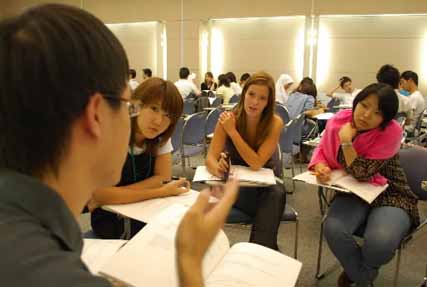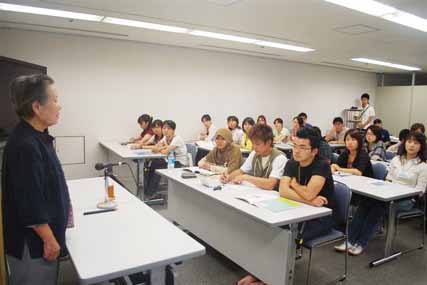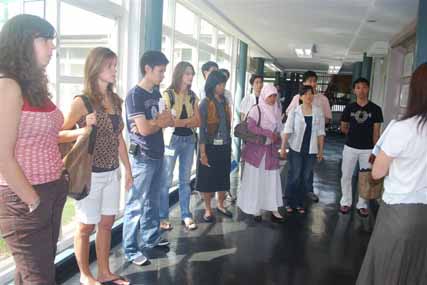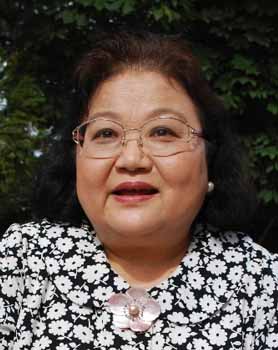Medical students gather in Hiroshima to examine the scars of war
Sep. 11, 2008
by Miho Kuwajima, Staff Writer
In a survey of college students in Hiroshima Prefecture, 21% said they would accept Japan’s possession of nuclear weapons while 62% said the abolition of nuclear weapons is impossible. The survey was conducted this summer by college students in the Chugoku Region. This suggests that perhaps Hiroshima has failed to convey to young people its desire that nuclear weapons be abolished. The Chugoku Shimbun visited a six-day summer school sponsored by the International Federation of Medical Student Associations Japan that got underway on August 25. What I sensed was a positive change in the medical students who planned and participated in the program.
The Hiroshima Summer School program was begun three years ago in response to a call by a Japanese medical student who felt there were things that medical students should learn in Hiroshima about the atomic bombing and the suffering of the survivors.
This year about 40 students, including eight foreign students from Mongolia, Indonesia, Slovenia, Slovakia, Ireland, and Taiwan, came to Japan for the program. They ranged in age from 19 to their early 30s. Most of the students, including those from Japan, knew little about the atomic bombing of Hiroshima.
Yuka Murakami, 25, who was in charge of planning the program, is a fifth-year medical student at Hiroshima University. A native of Imabari in Ehime Prefecture, Ms. Murakami said that after living in Hiroshima for more than four years she felt that there were many things she could learn in Hiroshima--not just about the atomic bombing. With the hope that the participants would take in as much as possible in the time spent here, she created a program that allowed students to study from various perspectives.
Participants in the program were housed near Hiroshima Peace Memorial Park. They toured Peace Memorial Museum and had an opportunity to hear an atomic bomb survivor recount her story. They also learned about the effects of radiation on survivors and their treatment from doctors at the Radiation Effects Research Foundation and the Hiroshima University Research Institute for Radiation Biology and Medicine.
In a seminar, the participants considered the history of the Manhattan Project and its work to manufacture the atomic bomb as well as the issue of war and medicine in connection with the Japanese Imperial Army’s Unit 731, whose doctors conducted experiments on Chinese, prisoners, and others during World War II. This topic was taken up in the belief that doctors constantly face the challenge of balancing progress in science and medical technology with ethics.
On the morning of the fifth day of the program, when the students were discussing their impressions of the summer school thus far, Tjasa Furlan, 20, a second-year medical student at the University of Ljubljana in Slovenia, suddenly began to cry. Ms. Furlan was 4 years old at the time of the 1991 10-day war in which Slovenia sought its independence from Yugoslavia. After that, war continued in neighboring countries.
To Ms. Furlan, who was raised in an affluent family, the 10-day war was a thing of the past, and the atomic bombings of Hiroshima and Nagasaki were events from an even more distant past. But while addressing the issues of war and peace every day in Hiroshima, things she had forgotten came back to her.
On the second day of the program students met with Taeko Teramae, 78, an atomic bomb survivor who said that girls who had keloid scars on their faces suffered discrimination throughout their lives. Ms. Furlan was reminded that since the Slovenian Independence War, Serbs in Slovenia have been subjected to subtle discrimination.
“During the war, the atmosphere in Ljubljana was tense and my parents were on edge,” she recalled. “War can break out suddenly,” she continued emphatically. “In war, innocent people are killed, friends become enemies, and distrust is created between ethnic groups. Wars must never be allowed to occur.”
Nahoko Ikoma, 25, a second-year medical student at Kagoshima University, said she spends a lot of time with foreign students from Indonesia, the Philippines, and other Southeast Asian countries.
With these friends, she talked about anti-Japan sentiment in China and an Indonesian friend told her that in Indonesia the Dutch colonizers and the Japanese, who occupied Indonesia during the war, were hated. This got Ms. Ikoma thinking about Japan’s responsibility for the war. But during the course of the program in Hiroshima she realized that war cannot be discussed thoroughly from the standpoint of either the victim or the aggressor.
When Ms. Murakami decided last fall that she would also like to take up the issue of science and ethics in the program, she consulted Hiroshi Ichikawa, 50, a professor at Hiroshima University’s Graduate School of Integrated Arts and Sciences, whose expertise is on the history of science and technology. Mr. Ichikawa suggested she address the topic of science and ethics from the perspective of Hiroshima, including the history of the Manhattan Project and the issue of “war and medicine.” He also tutored program staff on this subject.
Since the spring of 1997, Mr. Ichikawa has taught a class on “The History of the Development of the Atomic Bomb.” He said he has been alarmed to discover that many students feel that because the atomic bombing hastened the end of the war, it was not wrong or that the war led to the development of nuclear energy and enhanced people’s lives.
“By emphasizing only the tragedy of the atomic bombing,” said Mr. Ichikawa, “we have lost the ability to convey the global situation with regard to nuclear weapons.” Therefore, he continued, it is important for students to also learn about Japan’s efforts to develop an atomic bomb, the distress of the American scientists involved in the development of the bomb, and the inhumane medical research conducted by Japanese doctors during the war.
Tomoko Tamada, 24, a fifth-year medical student at Hiroshima University, noted that many students felt that the atomic bombing was a tragedy in the past and that there was no longer a need to learn about it. Looking back over the six days of the program, she said that lively debates took place despite the varied backgrounds of the students. “Nuclear proliferation has yet to be halted and new nuclear weapons are being developed,” she said. “But if we raise these issues, perhaps we can help prevent another tragedy.”
Their six-day stay in Hiroshima gave the medical students a good opportunity to consider how the story of the atomic bombing can be passed on to future generations.
Sense the fundamentals of medicine with both the mind and body
Katsuko Kataoka, M.D., Ph.D.
Secretary General, JPPNW
There is a tremendous amount of data in Hiroshima on the direct effects on the human body of the thermal rays and the blast from the atomic bombing as well as the long-term effects of radiation. At the same time, Hiroshima has accumulated a great deal of knowledge on medical care for atomic bomb survivors, including the latest treatments for the effects of radiation. How to address the mental health problems of the survivors is another important issue.
Another of the benefits of studying medicine in Hiroshima is the opportunity to directly ask doctors who have treated survivors how they felt at those times and to sense with both the mind and body such fundamentals of medicine as how badly war violates human rights and that nuclear weapons and human beings cannot coexist.
But the number of doctors with experience in treating atomic bomb survivors is dwindling, so it is important to seek them out, to create opportunities for them to talk with medical students, and to leave behind a record of their knowledge.
International Physicians for the Prevention of Nuclear War, which was jointly established by doctors in the United States and the Soviet Union in 1980, asked former Soviet President Mikhail Gorbachev and other leaders of nations possessing nuclear weapons to abolish them. We take pride that through our efforts since then we have played a role in preventing the use of nuclear weapons.
Statements by doctors have a major impact on the public. I would like to see more opportunities like the Hiroshima summer school so that more students will have a chance to study in Hiroshima.
Keywords
International Federation of Medical Student Associations (IFMSA)
Launched in 1951, a non-governmental organization and a member of the United Nations Economic and Social Council (ECOSOC). It has six standing committees such as “Human Rights and Peace,” “Public Health,” and “Reproductive Health including AIDS.” The General Secretariat is located at the World Medical Association in France. As of August of 2007, there are branches in 105 countries and regions. IFMSA-Japan has about 500 members.
(Originally published on September 8, 2008)
In a survey of college students in Hiroshima Prefecture, 21% said they would accept Japan’s possession of nuclear weapons while 62% said the abolition of nuclear weapons is impossible. The survey was conducted this summer by college students in the Chugoku Region. This suggests that perhaps Hiroshima has failed to convey to young people its desire that nuclear weapons be abolished. The Chugoku Shimbun visited a six-day summer school sponsored by the International Federation of Medical Student Associations Japan that got underway on August 25. What I sensed was a positive change in the medical students who planned and participated in the program.
The Hiroshima Summer School program was begun three years ago in response to a call by a Japanese medical student who felt there were things that medical students should learn in Hiroshima about the atomic bombing and the suffering of the survivors.
This year about 40 students, including eight foreign students from Mongolia, Indonesia, Slovenia, Slovakia, Ireland, and Taiwan, came to Japan for the program. They ranged in age from 19 to their early 30s. Most of the students, including those from Japan, knew little about the atomic bombing of Hiroshima.
Yuka Murakami, 25, who was in charge of planning the program, is a fifth-year medical student at Hiroshima University. A native of Imabari in Ehime Prefecture, Ms. Murakami said that after living in Hiroshima for more than four years she felt that there were many things she could learn in Hiroshima--not just about the atomic bombing. With the hope that the participants would take in as much as possible in the time spent here, she created a program that allowed students to study from various perspectives.
Participants in the program were housed near Hiroshima Peace Memorial Park. They toured Peace Memorial Museum and had an opportunity to hear an atomic bomb survivor recount her story. They also learned about the effects of radiation on survivors and their treatment from doctors at the Radiation Effects Research Foundation and the Hiroshima University Research Institute for Radiation Biology and Medicine.
In a seminar, the participants considered the history of the Manhattan Project and its work to manufacture the atomic bomb as well as the issue of war and medicine in connection with the Japanese Imperial Army’s Unit 731, whose doctors conducted experiments on Chinese, prisoners, and others during World War II. This topic was taken up in the belief that doctors constantly face the challenge of balancing progress in science and medical technology with ethics.
On the morning of the fifth day of the program, when the students were discussing their impressions of the summer school thus far, Tjasa Furlan, 20, a second-year medical student at the University of Ljubljana in Slovenia, suddenly began to cry. Ms. Furlan was 4 years old at the time of the 1991 10-day war in which Slovenia sought its independence from Yugoslavia. After that, war continued in neighboring countries.
To Ms. Furlan, who was raised in an affluent family, the 10-day war was a thing of the past, and the atomic bombings of Hiroshima and Nagasaki were events from an even more distant past. But while addressing the issues of war and peace every day in Hiroshima, things she had forgotten came back to her.
On the second day of the program students met with Taeko Teramae, 78, an atomic bomb survivor who said that girls who had keloid scars on their faces suffered discrimination throughout their lives. Ms. Furlan was reminded that since the Slovenian Independence War, Serbs in Slovenia have been subjected to subtle discrimination.
“During the war, the atmosphere in Ljubljana was tense and my parents were on edge,” she recalled. “War can break out suddenly,” she continued emphatically. “In war, innocent people are killed, friends become enemies, and distrust is created between ethnic groups. Wars must never be allowed to occur.”
Nahoko Ikoma, 25, a second-year medical student at Kagoshima University, said she spends a lot of time with foreign students from Indonesia, the Philippines, and other Southeast Asian countries.
With these friends, she talked about anti-Japan sentiment in China and an Indonesian friend told her that in Indonesia the Dutch colonizers and the Japanese, who occupied Indonesia during the war, were hated. This got Ms. Ikoma thinking about Japan’s responsibility for the war. But during the course of the program in Hiroshima she realized that war cannot be discussed thoroughly from the standpoint of either the victim or the aggressor.
When Ms. Murakami decided last fall that she would also like to take up the issue of science and ethics in the program, she consulted Hiroshi Ichikawa, 50, a professor at Hiroshima University’s Graduate School of Integrated Arts and Sciences, whose expertise is on the history of science and technology. Mr. Ichikawa suggested she address the topic of science and ethics from the perspective of Hiroshima, including the history of the Manhattan Project and the issue of “war and medicine.” He also tutored program staff on this subject.
Since the spring of 1997, Mr. Ichikawa has taught a class on “The History of the Development of the Atomic Bomb.” He said he has been alarmed to discover that many students feel that because the atomic bombing hastened the end of the war, it was not wrong or that the war led to the development of nuclear energy and enhanced people’s lives.
“By emphasizing only the tragedy of the atomic bombing,” said Mr. Ichikawa, “we have lost the ability to convey the global situation with regard to nuclear weapons.” Therefore, he continued, it is important for students to also learn about Japan’s efforts to develop an atomic bomb, the distress of the American scientists involved in the development of the bomb, and the inhumane medical research conducted by Japanese doctors during the war.
Tomoko Tamada, 24, a fifth-year medical student at Hiroshima University, noted that many students felt that the atomic bombing was a tragedy in the past and that there was no longer a need to learn about it. Looking back over the six days of the program, she said that lively debates took place despite the varied backgrounds of the students. “Nuclear proliferation has yet to be halted and new nuclear weapons are being developed,” she said. “But if we raise these issues, perhaps we can help prevent another tragedy.”
Their six-day stay in Hiroshima gave the medical students a good opportunity to consider how the story of the atomic bombing can be passed on to future generations.
Sense the fundamentals of medicine with both the mind and body
Katsuko Kataoka, M.D., Ph.D.
Secretary General, JPPNW
There is a tremendous amount of data in Hiroshima on the direct effects on the human body of the thermal rays and the blast from the atomic bombing as well as the long-term effects of radiation. At the same time, Hiroshima has accumulated a great deal of knowledge on medical care for atomic bomb survivors, including the latest treatments for the effects of radiation. How to address the mental health problems of the survivors is another important issue.
Another of the benefits of studying medicine in Hiroshima is the opportunity to directly ask doctors who have treated survivors how they felt at those times and to sense with both the mind and body such fundamentals of medicine as how badly war violates human rights and that nuclear weapons and human beings cannot coexist.
But the number of doctors with experience in treating atomic bomb survivors is dwindling, so it is important to seek them out, to create opportunities for them to talk with medical students, and to leave behind a record of their knowledge.
International Physicians for the Prevention of Nuclear War, which was jointly established by doctors in the United States and the Soviet Union in 1980, asked former Soviet President Mikhail Gorbachev and other leaders of nations possessing nuclear weapons to abolish them. We take pride that through our efforts since then we have played a role in preventing the use of nuclear weapons.
Statements by doctors have a major impact on the public. I would like to see more opportunities like the Hiroshima summer school so that more students will have a chance to study in Hiroshima.
Keywords
International Federation of Medical Student Associations (IFMSA)
Launched in 1951, a non-governmental organization and a member of the United Nations Economic and Social Council (ECOSOC). It has six standing committees such as “Human Rights and Peace,” “Public Health,” and “Reproductive Health including AIDS.” The General Secretariat is located at the World Medical Association in France. As of August of 2007, there are branches in 105 countries and regions. IFMSA-Japan has about 500 members.
(Originally published on September 8, 2008)











